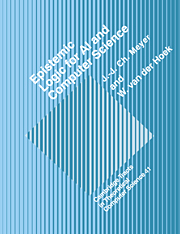0 - INTRODUCTION
Published online by Cambridge University Press: 11 November 2009
Summary
Knowledge and belief play an important role in everyday life. In fact, most of what we do has to do with the things we know or believe. Likewise, it is not so strange that when we have to specify the behaviour of artificial agents in order to program or implement them in some particular way, it is thought to be important to be interested in the ‘knowledge’ and ‘belief’ of such an agent. In many areas of computer science and artificial intelligence one is concerned with the description or representation of knowledge of users or even the systems themselves. For example, in database theory one tries to model knowledge about parts of reality in certain formal ways to render it implementable and accessible to users. In AI one tries to design knowledge-based decision-support systems that are intended to assist professional users in some specialists field when making decisions by providing pieces of knowledge and preferably some deductions from the input data by means of some inference mechanism. The representation and manipulation of knowledge of some sort is ubiquitous in the information sciences.
This book is not about knowledge representation in general, but rather concentrates on the logic of knowledge and belief. What (logical) properties do knowledge and belief have? What is the difference between knowledge and belief? We do not intend to answer these questions in a deep philosophical discussion of these notions.
- Type
- Chapter
- Information
- Epistemic Logic for AI and Computer Science , pp. 1 - 6Publisher: Cambridge University PressPrint publication year: 1995



